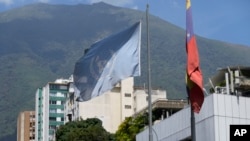Venezuela on Thursday ordered the U.N. human rights office in Caracas to shut down all operations, ordering the staff to leave the country within three days.
During a news conference, Foreign Affairs Minister Yvan Gil announced the decision, saying that the office had played an "inappropriate role" and had become the "private law firm of the coup plotters and terrorists who permanently conspire against the country."
He added that the decision would remain in effect until the office publicly rectified its "colonialist, abusive and violating attitude of the United Nations Charter."
The announcement came after the human rights office criticized Venezuela's decision to detain human rights attorney Rocio San Miguel, an incident that has drawn domestic and international concern.
The government detained her for what it said was her role in an alleged U.S.-backed plot to assassinate President Nicolas Maduro.
The human rights office urged Venezuela on the social media platform X to immediately release San Miguel and to grant her the right of legal defense.
San Miguel was detained at an airport close to Caracas while waiting for a flight to Miami with her daughter.
She was detained on Friday, although authorities didn’t announce it until Sunday, according to The Associated Press. Further, the AP said her attorney had not been allowed to meet with her as of Wednesday.
Members of San Miguel's family were detained as well, including her daughter, ex-husband, two brothers and former partner. Her former partner is still in custody, but the others have been released.
Attorney General Tarek William Saab said on Tuesday that San Miguel was being held at the Helicoide Prison, which is known for detaining political prisoners.
In the run-up to Venezuela’s presidential election, its highest court banned opposition rival Maria Corina Machado’s candidacy last month, garnering international criticism. The United States has said it is reviewing its Venezuela sanctions policy.
According to Marta Valinas, chairwoman of an independent U.N. Human Rights Council fact-finding mission to Venezuela, the acts of repression toward political opponents "are not isolated incidents, but rather … a coordinated plan to silence critics and perceived opponents."
Saab dismissed the claim as part of a "ferocious campaign from abroad" against Venezuela and its justice system.
Some information for this report came from The Associated Press and Agence France-Presse.





